Nigeria’s GDP grew by 2.01% in first quarter of 2019 —NBS
The National Bureau of Statistics (NBS), said the nation’s Gross Domestic Product (Nigeria’s GDP) grew by 2.01 per cent (year-on-year) in real terms in the first quarter of 2019. The NBS said this in its “Nigeria GDP Report for First Quarter 2019’’ released on Monday in Abuja.
According to the NBS, the figure is 0.12 per cent higher than the growth rate of 1.89 per cent recorded in the first quarter of 2018
It, however, said the figure, relative to the fourth quarter 2018, showed a decline by -0.38 per cent points.
According to the bureau, the strong performance recorded in the quarter may be due to general elections held within the first quarter of 2019.
It said the aggregate GDP stood at N31,79 million in nominal terms.
According to the NBS, the aggregate is, however, lower than the preceding quarter of N35,23 million by -9.75 per cent.
The bureau said the figure was higher than N28,43 million recorded in the first quarter of 2018, representing a year-on-year nominal growth rate of 11.80 per cent.
According to the NBS, the aggregate is, however, lower than the preceding quarter of N35,23 million by -9.75 per cent.
Key Insights by Bloomberg

- The slowdown in growth could increase pressure on the Nigerian Central Bank to cut interest rates further when its announces it policy decision on Tuesday. The Monetary Policy Committee unexpectedly reduced the key rate in March to help boost expansion.
- Economic growth slowed after the oil sector contracted 2.4 percent from a year earlier. The crude industry has declined every quarter since the three months through June 2018.
- The economy is recovering from the 2014 crash in crude prices and the International Monetary Fund forecasts that growth will accelerate to 2.1% this year from 1.9% in 2018. That would still leave it as one of Africa’s least buoyant economies and will be below the rate of population growth, which is almost 3%.
What Bloomberg’s Economist Says
“The first-quarter reading probably represents a temporary slowdown after a strong fourth quarter. As a result, we will be raising our growth forecasts for the remaining quarters of this year. Still, the first-quarter reading may still lead Bloomberg Economics to reduce its 2.5% forecast for economic growth in 2019 as a whole, albeit to above the 1.9% rate achieved in 2018.”
— Mark Bohlund, Bloomberg economist




